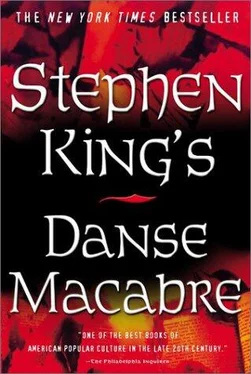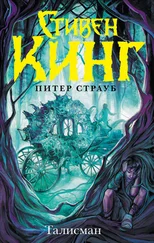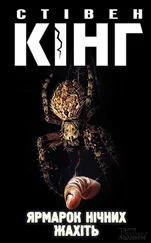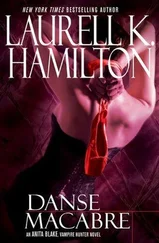My idea of growing up is that the process consists mainly of developing a good case of mental tunnel vision and a gradual ossification of the imaginative faculty (what about Little Miss Nobody, you ask me-well, hang on; we'll get there). Children see everything, consider everything; the typical expression of the baby which is full, dry, and awake is a vide-eyed goggle at everything. Hello, pleased to meet you, freaked to be here. A child has not yet developed the obsessional behavior patterns which we approvingly call "good work habits." He or she has not yet internalized the idea that a straight line is the shortest distance between two points.
All of that comes later. Children believe in Santa Claus. It's no big deal; just a piece of stored information. They likewise believe in the boogeyman, the Trix Rabbit, McDonaldland (where hamburgers grow on trees and moderate thievery is approved behavior-witness the lovable Hamburglar), the Tooth Fairy who takes ivory and leaves silver . . . all of these things are taken as a matter of course. These are some of the popular myths; there are others which, while more specialized, seem just as outré . Grampa leas gone to live with the angels. The stuff in the middle of the golf ball is the worst poison in the world. Step on a crack, break your mother's back. If you walk through holly bushes, your shadow can get caught and it will be left there forever, flapping on the sharp leaves.
The changes come gradually, as logic and rationalism assert themselves. The child begins to wonder how Santa can be at the Value House, on a downtown corner ringing a bell over a Salvation Army pot, and up at the North Pole generaling his troop of elves all at the same time.
The child maybe realizes that although lie's stepped on a hell of a lot of cracks, his or her mother's back is yet all right. Age begins to settle into that child's face. "Don't be a baby!" lie or she is told impatiently. "Your head is always in the clouds!" And the kicker, of course: "Aren't you ever going to grow up ?” After awhile, tile song says, Puff the magic dragon stopped trundling his way up the Cherry Lane to see his old goodbuddy Jackie Paper. Wendy and her brothers finally left Peter Pan and the Wild Boys to their fate. No more Magic Dust and only an occasional Happy Thought . . . but there was always something a little dangerous about Peter Pan, wasn't there? Something just a little too woodsy-v,ild? Something in his eyes that was . . . well, downright Dionysian.
Oh, the gods of childhood are immortal; tile big kids don't really sacrifice them; they just pass them on to their bratty kid brothers and kid sisters. It's childhood itself that's mortal: man is in love, and loves what passes. And it's not just Puff and Tink and Peter Pan that are left behind in that rush for the driver's license, the high school and college diploma, in that mostly eager training to achieve "good work habits." We have each exiled the Tooth Fairy (or perhaps he exiles us when we are no longer able to provide the product he requires), murdered Santa Claus (only to reanimate the corpse for our own children), killed the giant that chased Jack down the beanstalk. And the poor old boogeyman! Laughed to death again and again, like Mr.
Dark at the conclusion of Something Wicked This Way Comes .
Listen to me now: At eighteen or twenty or twenty-one, whatever the legal drinking age may be in your state, "getting carded" is something of an embarrassment. You have to fumble around for a driver's license or your State Liquor Card or maybe even a photostat of your birth certificate so you can get a simple fa' Chrissakes glass of beer. But you let ten years go past, get so you are looking the big three-o right in the eye, and there is something absurdly flattering about getting carded. It means you still look like you might not be old enough to buy a drink over the bar. You still look a little wet behind the ears. You still look young .
This got into my head a few years ago when I was in a bar called Benjaman's in Bangor, getting pleasantly loaded. I began to study the faces of entering patrons. The guy standing unobtrusively by the door let this one pass . . . and that one . . . and the next one. Then, bang!
He stopped a guy in a U of M jacket and carded him. And I'll be damned if that guy didn't do a quick fade. The drinking age in Maine was then eighteen (booze-related accidents on the highways have since caused the lawmakers to move the age up to twenty), and all of those people had looked about eighteen to me. So I got up and asked the bouncer how he knew that last guy was underage. He shrugged. "You just know," he said. "It's mostly in their eyes.” For weeks after, my hobby was looking at the faces of adults and trying to decide exactly what it was that made them "adult faces." The face of a thirty -year-old is healthy, unwrinkled, and no bigger than the face of a seventeen-year-old. Yet you know that's no kid; you know . There seems to be some hidden yet overriding characteristic that makes what we all agree is the Adult Face. It isn't just the clothes or the stance, it isn't the fact that the thirty -year-old is toting a briefcase and the seventeen-year-old is toting a knapsack; if you put the head of each in one of those carnival cut-outs which show the body of a capering sailor or a prize-fighter, you could still pick out the adult ten tries out of ten.
I came to believe that the bouncer was right. It's in the eyes.
Not something that's there; something, rather, that has left.
Kids are bent. They think around corners. But starting at roughly age eight, when childhood's second great era begins, the kinks begin to straighten out, one by one. The boundaries of thought and vision begin to close down to a tunnel as we gear up to get along.
At last, unable to grapple to any profit with Never-Never Land anymore, we may settle for the minor-league version available at the local disco . . . or for a trip to Disney World one February or March.
The imagination is an eye, a marvelous third eye that floats free. As children, that eye sees with 20/20 clarity. As we grow older, its vision begins to dim . . . and one day the guy at the door lets you into the bar without asking to see any ID and that's it for you, Cholly; your hat is over the windmill. It's in your eyes. Something in your eyes. Check them out in the mirror and tell me if I'm wrong.
The job of the fantasy writer, or the horror writer, is to bust the walls of that tunnel vision wide for a little while; to provide a single powerful spectacle for that third eye. The job of the fantasy-horror writer is to make you, for a little while, a child again.
And the horror writer himself /herself? Someone else looks at that item about Little Miss Nobody (toldja we'd get back to her, and here she is, still unidentified, as mysterious as the Wolf Boy of Paris) and says, "Jeez, you never can tell, can you?" and goes on to something else. But the fantasist begins to play with it as a child would, speculating about children from other dimensions, about dopplegangers, about God knows what. It's a child's toy, something bright and shiny and strange. Let us pull a lever and see what it does, let us push it across the floor and see if it goes Rum-Rum-Rum or wacka-wacka-wacka . Let us turn it over and see if it will magically right itself again. In short, let us have our Fortian rains of frogs and people who have mysteriously burned to death while sitting at home in their easy chairs; let us have our vampires and our werewolves. Let us have Little Nobody, who perhaps slipped sideways through a crack in reality, only to be trampled to death in the rush from a burning circus tent.
And something of this is reflected in the eyes of those who write horror stories. Ray Bradbury has the dreamy eyes of a child. So, behind his thick glasses, does Jack Finney. The same look is in Lovecraft's eyes-they startle with their simple dark directness, especially in that narrow, pinched, and somehow eternal New England face. Harlan Ellison, in spite of his rapid jive-talking shoot-from-the-hip Nervous-Norvus mode of conversation (talking with Harlan can sometimes be like talking with an apocalyptic Saladmaster salesman who has just taken three large bennies), has those eyes. Every now and then he'll pause, looking away, looking at something else, and you know that it's true: Harlan is bent, and he just thought his way around a corner. Peter Straub, who dresses impeccably and who always seems to project the aura of some big company success, also has that look in his eyes. It is an indefinable look, but it's there.
Читать дальше










